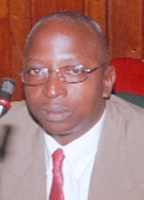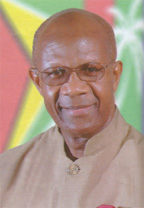There is a call from some opposition parliamentarians for campaign financing reforms, including the introduction of laws to monitor an incumbent government’s utilisation of public funds during election periods.

GAP/ROAR MP Everall Franklin told Stabroek News that such laws were needed to govern the projects an incumbent administration was allowed to conduct leading up to elections. He said the issue would have to be included under the wider umbrella of party campaign expenses. “It also has to come with some rules for incumbents; what they could do in an election year because a lot of projects sometimes are just kept back and doled out in an election year to sway public opinion,” he explained.
A recent announcement by President Bharrat Jagdeo that his administration would pledge some US$30M over the next three years to buy laptops for some 90,000 poor families has been seen in some quarters as the government looking to capitalise on its incumbent status with elections due next year.
However, Franklin noted that campaign financing was a complex issue that needed sufficient time to be dealt with and as such should be addressed after the elections. “I think that the whole issue of campaign financing should be reviewed, but it cannot be dealt with at this stage. It certainly should be reviewed after this election because the time is way too short to start dabbling with that. I don’t think we’ll have enough time to reach a resolution on it,” he said.

Chief Whip for the main opposition PNCR Lance Carberry acknowledged that campaign financing was a matter of transparency but he added that there were more pressing matters to be dealt with. “I don’t know that anyone has put their mind to that. We have more important things to worry about like the governance of this country. But it should be talked about and I will raise it with my colleagues.”
Carberry said the Guyana Elections Commission (Gecom) should be taking the lead on the issue, since it had the mandate of regulating the conduct of elections.
In a document created for the Organisation of American States (OAS) in 2004, current AFC vice-chairperson and MP Sheila Holder argued that the policy of parties raising campaign financing from private citizens had contributed to the incumbent government misusing its executive influence to favour select private contractors who had contributed heavily to their election campaigns. She added that there was also a great financial disparity in favour of the government in the quantity of funds ploughed into election campaigns, compared with that spent by contesting opposition parties. “The PPP/C as the governing party clearly outspends, by leaps and bounds, the major opposition party, the PNCR, which is seen as the next big campaign spender. Small parties become invisible in this milieu,” Holder stated.

She added that neither party had shown a willingness to disclose how much money had been spent at the 2001 elections, but that a guess could be hazarded from the PNCR’s disclosure that a group of overseas donors had raised some US$1M. In 1990, amendments were made to the Representation of the People Act limiting personal campaign expenses to $25,000 per candidate and a maximum of $50,000 multiplied by a maximum number of 53 from a total number of 65 candidates for each contesting political party. The exchange rate at the time was US$1 to G$45.
Holder told Stabroek News that she disagreed with the position that campaign financing reform should be dealt with at a later date. According to her, it had a direct impact on free and fair elections and consequences for governing parties who received funds from less than reputable sources. “If you get dirty money you almost have an obligation to fulfil their interest and this has a direct impact on governance and elected democracy,” she declared.
She called for the introduction of public financing of the campaigning parties as a way around the problem and to address the disparity in spending. “When parties are funded by the Treasury it creates a greater chance of levelling the playing field in a fledgling democracy like ours. It also ensures that no party will have to kowtow to special interests in our society.”
Holder echoed the call for regulation of the incumbent’s spending, noting that the Government of India had introduced measures to curtail the behaviour of incumbents there. “Any society that is serious about transparency ought to be concerned about this,” she said.
Meanwhile, Holder acknowledged that the figure stipulated by the law was “unrealistic,” but added that the parties were knowingly breaking it and then wanted to talk about the rule of law. Gecom’s Chief Election Officer (CEO) Gocool Boodoo too, the AFC executive said, should be castigated since the law clearly stated that it was the CEO’s mandate to ensure the law governing elections expenses was followed. “This way of turning a blind eye speaks to the root cause why our society has disintegrated the way it has. I do not accept the tolerance of the CEO and the political parties of the breaches of his mandate under the act,” she said.
Several efforts to contact Boodoo for a comment on the issue were unsuccessful.





